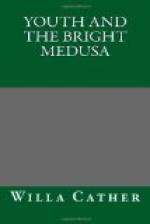We walked until the procession of carriages on the driveway, getting people home to dinner, grew thin, and then we went slowly toward the Seventh Avenue gate, still talking of Charley Wilton. We decided to dine at a place not far away, where the only access from the street was a narrow door, like a hole in the wall, between a tobacconist’s and a flower shop. Cressida deluded herself into believing that her incognito was more successful in such non-descript places. She was wearing a long sable coat, and a deep fur hat, hung with red cherries, which she had brought from Russia. Her walk had given her a fine colour, and she looked so much a personage that no disguise could have been wholly effective.
The dining-rooms, frescoed with conventional Italian scenes, were built round a court. The orchestra was playing as we entered and selected our table. It was not a bad orchestra, and we were no sooner seated than the first violin began to speak, to assert itself, as if it were suddenly done with mediocrity.
“We have been recognized,” Cressida said complacently. “What a good tone he has, quite unusual. What does he look like?” She sat with her back to the musicians.
The violinist was standing, directing his men with his head and with the beak of his violin. He was a tall, gaunt young man, big-boned and rugged, in skin-tight clothes. His high forehead had a kind of luminous pallour, and his hair was jet black and somewhat stringy. His manner was excited and dramatic. At the end of the number he acknowledged the applause, and Cressida looked at him graciously over her shoulder. He swept her with a brilliant glance and bowed again. Then I noticed his red lips and thick black eyebrows.
“He looks as if he were poor or in trouble,” Cressida said. “See how short his sleeves are, and how he mops his face as if the least thing upset him. This is a hard winter for musicians.”
The violinist rummaged among some music piled on a chair, turning over the sheets with flurried rapidity, as if he were searching for a lost article of which he was in desperate need. Presently he placed some sheets upon the piano and began vehemently to explain something to the pianist. The pianist stared at the music doubtfully—he was a plump old man with a rosy, bald crown, and his shiny linen and neat tie made him look as if he were on his way to a party. The violinist bent over him, suggesting rhythms with his shoulders and running his bony finger up and down the pages. When he stepped back to his place, I noticed that the other players sat at ease, without raising their instruments.
“He is going to try something unusual,” I commented. “It looks as if it might be manuscript.”
It was something, at all events, that neither of us had heard before, though it was very much in the manner of the later Russian composers who were just beginning to be heard in New York. The young man made a brilliant dash of it, despite a lagging, scrambling accompaniment by the conservative pianist. This time we both applauded him vigorously and again, as he bowed, he swept us with his eye.




